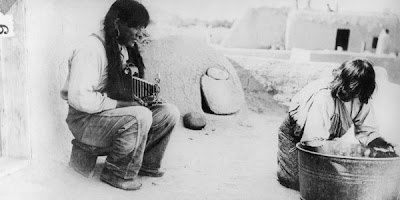While I waited to see my dentist last Tuesday, I browsed through
Forever New Mexico, a book of vintage photos edited by Arnold Vigil. Over the Table of Contents was the photo below. The caption read: "A woman snaps a picture of another woman next to a hogan on the Navajo Nation in western New Mexico. Date and photographer unknown, New Mexico Magazine Archival Collection."

The camera looked like an
Argus rangefinder model from the '30s or '40s. Midway through the book is another picture of what looks to be the same camera, though it is in the hands of a different woman, portrayed as she "snaps a picture at the Gallup Inter-Tribal Indian Ceremonial." It clearly is an Argus rangefinder, either a C2 or C3 model. The (actual) photographer and date of the picture are again unknown.

Further on in the book is a much older photo in which one of the figures is cradling a Kodak No.3A folder, a camera dating from 1910-1914 that used 122 film and produced 3.25 in. x 5.5 in. negatives. The caption reads: "Agapito Pino photographs his mother washing clothes at San Ildefonso Pueblo sometime in the 1920s. Photographer unknown, courtesy of Museum of New Mexico (Negative No. 3740)."

I did a search on the name of the fellow with the old Kodak and turned up a 1939 picture of an "Agapito Pino", described as a "San Ildefonzo Indian Clown Dancer". It seems quite likely it is the same fellow ten or fifteen years along. The photographer who made the picture of the later Agapito was Burton Frasher, who produced tens of thousands of postcard photos during the first half of the Twentieth Century all over the Southwest. The Frasher Postcard Collection is housed at the Pomona Public Library.

All the pictures have a staged look, but they are still rather charming, I think, and I was very pleased with this unexpected find. It was certainly one of my better experiences in a dentist's office.




















